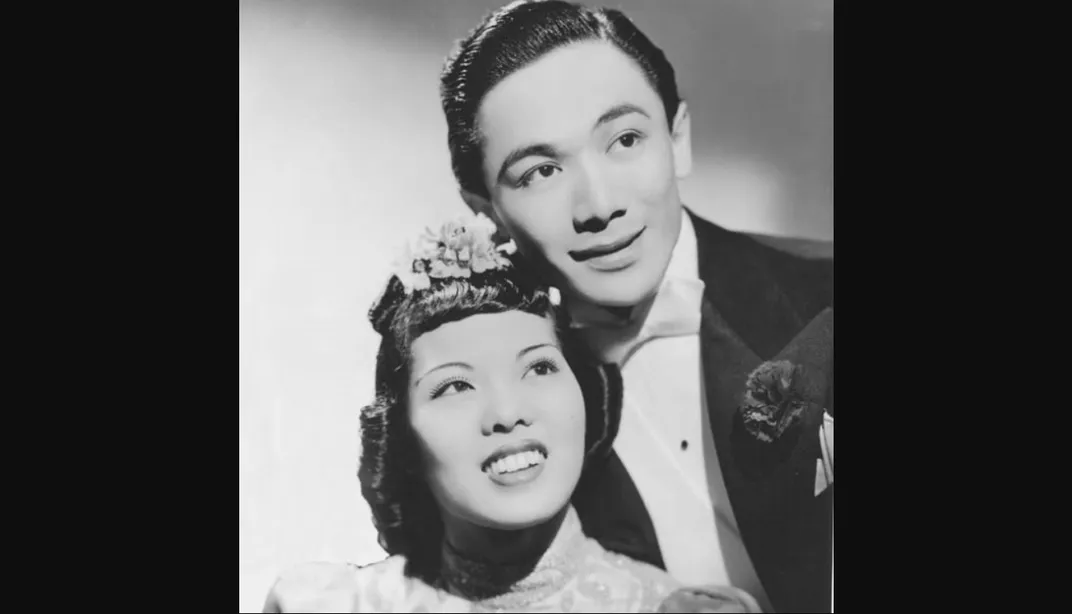Remembering Dorothy Toy, a Dazzling Asian-American Tap Dance Star
She and her dance partner Paul Wing appeared together as stars of stage and screen, but they were not immune to prejudicial attitudes

In the 1930s and '40s, Dorothy Toy and Paul Wing lit up stages around the world, dazzling audiences with their acrobatic, gleeful footwork. They were dubbed “the Chinese Fred Astaire and Ginger Rogers”—though in reality, only Wing was Chinese. Toy was of Japanese descent, and she keenly felt the anti-Japanese racism that permeated America during WWII. She was not, however, prepared to shrink into the shadows.
“We went through a lot of prejudice,” Toy said in a 2016 documentary, Dancing Through Life: The Dorothy Toy Story, “But you have to face it.”
Toy died last month at the age of 102, according to the New York Times’ Neil Genzlinger. She is survived by her daughter, Dorlie and son, Peter.
Born Shigeko Takahashi in 1917, Toy was raised in Los Angeles, California, where her parents ran a restaurant. A vaudeville theater sat across from the eatery, and when the venue’s manager spotted Toy dancing outside the restaurant, he encouraged her mother to sign the child up for lessons. Toy began studying with a Russian dance instructor; the leaps and jumps of Cossack dances would become a signature part of her eclectic repertoire.
In 1934, Toy, her sister, Helen, and Wing appeared together in the film Happiness Ahead, and afterward decided to form a dance trio that they dubbed “The Three Majong’s.” Once Toy had graduated from high school, they packed their belongings into a Model T and headed to Chicago, hoping to make it big under the bright lights. Helen, according to Matt Schudel of the Washington Post, ultimately left the group to pursue a singing career, but Toy and Wing continued to dance together for some years.
They headlined vaudeville venues, danced on Broadway and, according to Dancing Through Life, were the first Asian-Americans to perform at the London Palladium Theater. Toy and Wing appeared together in the short musical, Deviled Ham, and toured with Chico Marx, of the Marx Brothers fame. Their performances were energetic and robust, incorporating a variety of styles.
“It wasn't a ballroom, it wasn't a jazz, it was a swing number, and it had a little bit of Lindy in it, a little rock and roll, just a little bit of that,” Toy told NPR’s David Greene in 2009. “We had little snatches of everything, but we did it ballroom style.”
Toy and Wing got married in 1940—not out of romantic love, according to Dancing Through Life, but so it would be easier for them to travel together. Yet their careers would soon be hit with an obstacle that a marriage of convenience could not solve. In 1941, the Japanese attacked Pearl Harbor, plunging the United States into the fray of the Second World War. Like many other Japanese Americans, Toy’s parents were forced Topaz, Utah. While both sisters managed to avoid the same fate by settling in New York—California, where their parents were living, was home to a large population of Japanese Americans and had been declared a military zone—gossip columnists nevertheless spread the word about Toy’s heritage. Emil Guillermo of NBC News reports that Toy used to scribble out the negative coverage with black ink. In 2013, she told CBS affiliate KPIX that revelations about her ancestry cost her a movie contract.
Yet another blow came when Wing was drafted into the military. When he came back from the war, he “wasn’t the same person that I danced with,” Toy told NPR’s Greene. Their marriage ended, but they continued to perform together at San Francisco’s Forbidden City nightclub. They also founded a dance troupe of Asian performers, which toured the United States, Canada, Europe and Japan. Eventually, Toy began working as a pharmacy technician in California, but she never forgot the thrill of performing live before an adoring crowd. She continued to teach dance into her 90s, pursuing a love for the artform that began when she was a little girl.
“It makes you happy when you have a live audience,” Toy once said, per NBC’s Guillermo. “They say, ‘That’s great,’ and you feel like a million dollars, that’s the kind of [feeling] you get. But you don’t want the million, you just want the applause.”